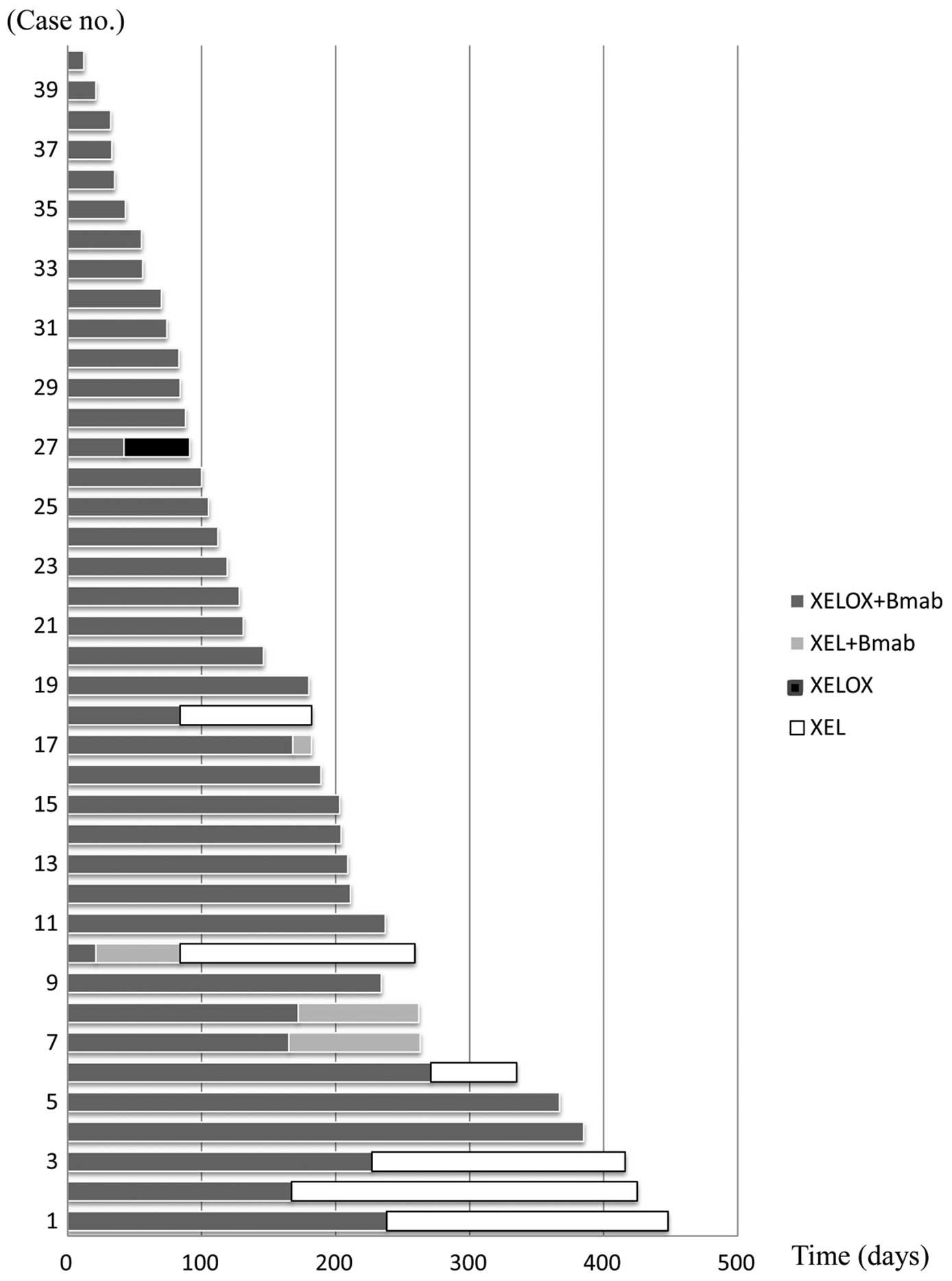|
1.
|
Parkin DM, Bray F, Ferlay J, et al: Global
cancer statistics, 2002. CA Cancer J Clin. 55:74–108. 2005.
View Article : Google Scholar
|
|
2.
|
Kotake K, Honjo S, Sugihara K, et al:
Changes in colorectal cancer during a 20-year period: an extended
report from the multi-institutional registry of large bowel cancer,
Japan. Dis Colon Rectum. 46(Suppl 10): S32–S43. 2003.PubMed/NCBI
|
|
3.
|
de Gramont A, Figer A, Seymour M, et al:
Leucovorin and fluorouracil with or without oxaliplatin as
first-line treatment in advanced colorectal cancer. J Clin Oncol.
18:2938–2947. 2000.
|
|
4.
|
Goldberg RM, Sargent DJ, Morton RF, et al:
A randomized controlled trial of fluorouracil plus leucovorin,
irinotecan, and oxaliplatin combinations in patients with
previously untreated metastatic colorectal cancer. J Clin Oncol.
22:23–30. 2004. View Article : Google Scholar
|
|
5.
|
Hoff PM, Ansari R, Batist G, et al:
Comparison of oral capecitabine versus intravenous fluorouracil
plus leucovorin as first-line treatment in 605 patients with
metastatic colorectal cancer: results of a randomized phase III
study. J Clin Oncol. 19:2282–2292. 2001.
|
|
6.
|
Van Cutsem E, Twelves C, Cassidy J, et al:
Oral capecitabine compared with intravenous fluorouracil plus
leucovorin in patients with metastatic colorectal cancer: results
of a large phase III study. J Clin Oncol. 19:4097–4106. 2001.
|
|
7.
|
Twelves C, Wong A, Nowacki MP, et al:
Capecitabine as adjuvant treatment for stage III colon cancer. N
Engl J Med. 352:2696–2704. 2005. View Article : Google Scholar : PubMed/NCBI
|
|
8.
|
Cassidy J, Clarke S, Diaz-Rubio E, et al:
Randomized phase III study of capecitabine plus oxaliplatin
compared with fluorouracil/folinic acid plus oxaliplatin as
first-line therapy for metastatic colorectal cancer. J Clin Oncol.
26:2006–2012. 2008. View Article : Google Scholar : PubMed/NCBI
|
|
9.
|
Ducreux M, Bennouna J, Hebbar M, et al:
Capecitabine plus oxaliplatin (XELOX) versus
5-fluorouracil/leucovorin plus oxaliplatin (FOLFOX-6) as first-line
treatment for metastaic colorectal cancer. Int J Cancer.
128:682–690. 2011. View Article : Google Scholar : PubMed/NCBI
|
|
10.
|
Rothenberg ML, Cox JV, Butts C, et al:
Capecitabine plus oxaliplatin (XELOX) versus 5-fluorouracil/folinic
acid plus oxaliplatin (FOLFOX-4) as second-line therapy in
metastatic colorectal cancer: a randomized phase III noninferiority
study. Ann Oncol. 19:1720–1726. 2008. View Article : Google Scholar
|
|
11.
|
Saltz LB, Clarke S, Diaz-Rubio E, et al:
Bevacizumab in combination with oxaliplatin-based chemotherapy as
first-line therapy in metastatic colorectal cancer: a randomized
phase III study. J Clin Oncol. 26:2013–2019. 2008. View Article : Google Scholar : PubMed/NCBI
|
|
12.
|
Doi T, Boku N, Kato K, et al: Phase I/II
study of capecitabine plus oxaliplatin (XELOX) plus bevacizumab as
first-line therapy in Japanese patients with metastatic colorectal
cancer. Jpn J Clin Oncol. 40:913–920. 2010. View Article : Google Scholar : PubMed/NCBI
|
|
13.
|
Hurwitz H, Fehrenbacher L, Novotny W, et
al: Bevacizumab plus irinotecan, fluorouracil, and leucovorin for
metastatic colorectal cancer. N Engl J Med. 350:2335–2342. 2004.
View Article : Google Scholar : PubMed/NCBI
|
|
14.
|
Kabbinavar FF, Schulz J, McCleod M, et al:
Addition of bevacizumab to bolus fluorouracil and leucovorin in
first-line metastatic colorectal cancer: results of a randomized
phase II trial. J Clin Oncol. 23:3697–3705. 2005. View Article : Google Scholar : PubMed/NCBI
|
|
15.
|
Cassidy J, Clarke S, Diaz-Rubio E, et al:
XELOX vs FOLFOX-4 as first-line therapy for metastatic colorectal
cancer: NO16966 updated results. Br J Cancer. 105:58–64. 2011.
View Article : Google Scholar : PubMed/NCBI
|
|
16.
|
Tol J, Koopman M, Cats A, et al:
Chemotherapy, bevacizumab, and cetuximab in metastatic colorectal
cancer. N Engl J Med. 360:563–572. 2009. View Article : Google Scholar : PubMed/NCBI
|
|
17.
|
Hochster HS, Hart LL, Ramanathan RK, et
al: Safety and efficacy of oxaliplatin and fluoropyrimidine
regimens with or without bevacizumab as first-line treatment of
metastatic colorectal cancer: results of the TREE Study. J Clin
Oncol. 26:3523–3539. 2008. View Article : Google Scholar
|
|
18.
|
Hyodo I, Shirao K, Doi T, et al: A phase
II study of the global dose and schedule of capecitabine in
Japanese patients with metastatic colorectal cancer. Jpn J Clin
Oncol. 36:410–417. 2006. View Article : Google Scholar : PubMed/NCBI
|
|
19.
|
Yoshino T, Boku N, Onozawa Y, et al:
Efficacy and safety of an irinotecan plus bolus 5-fluorouracil and
L-leucovorin regimen for metastatic colorectal cancer in Japanese
patients: experience in a single institution in Japan. Jpn J Clin
Oncol. 37:686–691. 2007. View Article : Google Scholar
|
|
20.
|
Haller DG, Cassidy J, Clarke SJ, et al:
Potential regional differences for the tolerability profiles of
fluoropyrimidines. J Clin Oncol. 26:2118–2123. 2008. View Article : Google Scholar : PubMed/NCBI
|
|
21.
|
Tournigand C, Cervantes A, Figer A, et al:
OPTIMOX-1: a randomized study of FOLFOX4 or FOLFOX7 with
oxaliplatin in a stop-and-go fashion in advanced colorectal cancer
- a GERCOR study. J Clin Oncol. 24:394–400. 2006. View Article : Google Scholar : PubMed/NCBI
|
|
22.
|
Feliu J, Safont MJ, Salud A, et al:
Capecitabine and bevacizumab as first-line treatment in elderly
patients with metastatic colorectal cancer. Br J Cancer.
102:1468–1473. 2010. View Article : Google Scholar : PubMed/NCBI
|















